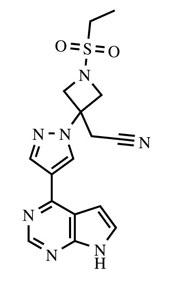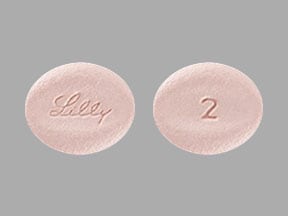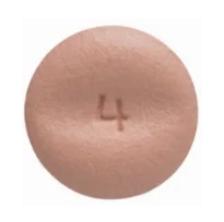Olumiant
Generic name: baricitinib
Drug classes: Antirheumatics, Selective immunosuppressants
Medically reviewed by A Ras MD.
What is Olumiant?
Olumiant is a prescription medicine used to treat adult patients with moderately to severely active rheumatoid arthritis after treatment with at least one other medicine called a Tumor Necrosis Factor (TNF) antagonist has been used, and did not work well enough or could not be tolerated.
It is not known if Olumiant is safe and effective in children.
Description
OLUMIANT (baricitinib) is a Janus kinase (JAK) inhibitor with the chemical name {1-(ethylsulfonyl)-3-[4-(7H-pyrrolo[2,3-d]pyrimidin-4-yl)-1H-pyrazol-1-yl]azetidin-3-yl}acetonitrile. Baricitinib has an empirical formula of C16H17N7O2S and a molecular weight of 371.42. Baricitinib has the following structural formula:

OLUMIANT tablets contain a recessed area on each face of the tablet surface and are available for oral administration as debossed, film-coated, immediate-release tablets. The 1 mg tablet is very light pink, round, debossed with “Lilly” on one side and “1” on the other. The 2 mg tablet is light pink, oblong, debossed with “Lilly” on one side and “2” on the other. The 4 mg tablet is medium pink, round, debossed with “Lilly” on one side and “4” on the other.
Each tablet contains 1, 2, or 4 mg of baricitinib and the following inactive ingredients: croscarmellose sodium, ferric oxide, lecithin (soya), magnesium stearate, mannitol, microcrystalline cellulose, polyethylene glycol, polyvinyl alcohol, talc and titanium dioxide.
Mechanism of Action
Baricitinib is a Janus kinase (JAK) inhibitor. JAKs are intracellular enzymes which transmit signals arising from cytokine or growth factor-receptor interactions on the cellular membrane to influence cellular processes of hematopoiesis and immune cell function. Within the signaling pathway, JAKs phosphorylate and activate Signal Transducers and Activators of Transcription (STATs) which modulate intracellular activity including gene expression. Baricitinib modulates the signaling pathway at the point of JAKs, preventing the phosphorylation and activation of STATs.
JAK enzymes transmit cytokine signaling through their pairing (e.g., JAK1/JAK2, JAK1/JAK3, JAK1/TYK2, JAK2/JAK2, JAK2/TYK2). In cell-free isolated enzyme assays, baricitinib had greater inhibitory potency at JAK1, JAK2 and TYK2 relative to JAK3. In human leukocytes, baricitinib inhibited cytokine induced STAT phosphorylation mediated by JAK1/JAK2, JAK1/JAK3, JAK1/TYK2, or JAK2/TYK2 with comparable potencies. However, the relevance of inhibition of specific JAK enzymes to therapeutic effectiveness is not currently known.
What is the most important information I should know about Olumiant?
Olumiant may cause serious side effects, including:
1. Serious infections.
Olumiant is a medicine that affects your immune system. Olumiant can lower the ability of your immune system to fight infections. Some people have had serious infections while taking Olumiant, including tuberculosis (TB), and infections caused by bacteria, fungi, or viruses that can spread throughout the body. Some people have died from these infections.
- Your healthcare provider should test you for TB before starting treatment with Olumiant.
- Your healthcare provider should watch you closely for signs and symptoms of TB during treatment with Olumiant. You should not start taking Olumiant if you have any kind of infection unless your healthcare provider tells you it is okay. You may be at a higher risk of developing shingles.
- Before starting Olumiant, tell your healthcare provider if you:
- are being treated for an infection.
- have an infection that does not go away or that keeps coming back.
- have diabetes, chronic lung disease, HIV, or a weak immune system. People with these conditions have a higher chance for infections.
- have TB or have been in close contact with someone with TB.
- have had hepatitis B or C.
- live or have lived, or have traveled to certain parts of the country (such as the Ohio and Mississippi River valleys and the Southwest) where there is an increased chance for getting certain kinds of fungal infections. These infections may happen or become more severe if you use Olumiant. Ask your healthcare provider if you do not know if you have lived in an area where these infections are common.
- think you have an infection or have symptoms of an infection such as:
- fever, sweating, or chills
- shortness of breath
- warm, red, or painful skin or sores on your body
- feeling tired
- muscle aches
- blood in your phlegm
- diarrhea or stomach pain
- cough
- weight loss
- burning when you urinate or urinating more often than normal
- After starting Olumiant, call your healthcare provider right away if you have any symptoms of an infection. Olumiant can make you more likely to get infections or make worse any infection that you have.
2. Cancer and immune system problems.
Olumiant may increase your risk of certain cancers by changing the way your immune system works.
- Lymphoma and other cancers including skin cancers can happen in people taking Olumiant. Tell your healthcare provider if you have ever had any type of cancer.
3. Blood Clots.
Blood clots in the veins of your legs (deep vein thrombosis, DVT) or lungs (pulmonary embolism, PE) can happen in some people taking Olumiant. This may be life-threatening and cause death.
- Tell your healthcare provider if you have had blood clots in the veins of your legs or lungs in the past.
- Tell your healthcare provider right away if you have any signs and symptoms of blood clots during treatment with Olumiant, including: swelling, pain or tenderness in the leg, sudden unexplained chest pain, or shortness of breath.
4. Tears (perforation) in the stomach or intestines.
- Tell your healthcare provider if you have had diverticulitis (inflammation in parts of the large intestine) or ulcers in your stomach or intestines. Some people taking Olumiant can get tears in their stomach or intestines. This happens most often in people who also take nonsteroidal anti-inflammatory drugs (NSAIDs), corticosteroids, or methotrexate.
- Tell your healthcare provider right away if you have fever and stomach-area pain that does not go away, and a change in your bowel habits.
5. Changes in certain laboratory test results.
Your healthcare provider should do blood tests before you start taking Olumiant and while you take Olumiant to check for the following:
- low lymphocyte counts. Lymphocytes are white blood cells that help the body fight off infections.
- low neutrophil counts. Neutrophils are white blood cells that help the body fight off infections.
- low red blood cell counts. This may mean that you have anemia, which may make you feel weak and tired.
Your healthcare provider should routinely check certain liver tests.
You should not receive Olumiant if your lymphocyte count, neutrophil count, or red blood cell count is too low or your liver tests are too high.
Your healthcare provider may stop your Olumiant treatment for a period of time if needed because of changes in these blood test results.
You may also have changes in other laboratory tests, such as your blood cholesterol levels. Your healthcare provider should do blood tests to check your cholesterol levels approximately 12 weeks after you start taking Olumiant, and as needed after that. Normal cholesterol levels are important to good heart health.
6. Allergic Reactions.
Symptoms such as rash, swelling of your lips, tongue, or throat, or hives (raised, red patches of skin that are often very itchy) that may mean you are having an allergic reaction have been seen in patients taking Olumiant. Some of these reactions were serious. If any of these symptoms occur while you are taking Olumiant, stop taking Olumiant and call your healthcare provider right away.
See “What are the possible side effects of Olumiant?” for more information about side effects.
What should I tell my healthcare provider before taking Olumiant?
Before taking Olumiant, tell your healthcare provider about all your medical conditions, including if you:
- See “What is the most important information I should know about Olumiant?”
- have an infection.
- have kidney problems.
- have liver problems.
- have low red or white blood cell counts.
- have recently received or are scheduled to receive a vaccine. People who take Olumiant should not receive live vaccines.
- have any stomach area (abdominal) pain or been diagnosed with diverticulitis or ulcers in your stomach or intestines.
- are pregnant or plan to become pregnant. It is not known if Olumiant will harm an unborn baby.
- are breastfeeding or plan to breastfeed. It is not known if Olumiant passes into your breast milk. You and your healthcare provider should decide if you will take Olumiant or breastfeed. You should not do both.
Tell your healthcare provider about all the medicines you take, including prescription and over-the-counter medicines, vitamins, and herbal supplements. Olumiant and other medicines may affect each other causing side effects.
Especially tell your healthcare provider if you take:
- a medicine called probenecid.
- any other medicines to treat your rheumatoid arthritis. For example, you should not take tocilizumab (Actemra), etanercept (Enbrel), adalimumab (Humira), infliximab (Remicade), rituximab (Rituxan), abatacept (Orencia), anakinra (Kineret), certolizumab pegol (Cimzia), golimumab (Simponi), tofacitinib (Xeljanz, Xeljanz XR), sarilumab (Kevzara), azathioprine or cyclosporine while you are taking Olumiant. Taking Olumiant with these medicines may increase your risk of infection.
Know the medicines you take. Keep a list of them to show your healthcare provider and pharmacist when you get a new medicine.
How should I take Olumiant?
- Take Olumiant exactly as your healthcare provider tells you to take it.
- Take Olumiant 1 time a day with or without food.
What are the possible side effects of Olumiant?
Olumiant can cause serious side effects including:
- See “What is the most important information I should know about Olumiant?”
Common side effects of Olumiant include (these are not all of the possible side effects of Olumiant):
- upper respiratory tract infections (common cold, sinus infections)
- nausea
- cold sores
- shingles
Call your doctor for medical advice about side effects. You may report side effects to FDA at 1-800-FDA-1088.
Olumiant Images
-
Olumiant 2 mg -
Olumiant 4 mg
General information about the safe and effective use of Olumiant
Medicines are sometimes prescribed for purposes other than those listed in a Medication Guide. Do not use Olumiant for a condition for which it was not prescribed. Do not give Olumiant to other people, even if they have the same symptoms that you have. It may harm them.
You can ask your healthcare provider or pharmacist for information about Olumiant that is written for health professionals.
How should I store Olumiant?
- Store Olumiant at room temperature between 68°F to 77°F (20°C to 25°C).
- Keep Olumiant and all medicines out of the reach of children.
What are the ingredients in Olumiant?
Active ingredient: baricitinib
Inactive ingredients: croscarmellose sodium, magnesium stearate, mannitol, microcrystalline cellulose, ferric oxide, lecithin (soya), polyethylene glycol, polyvinyl alcohol, talc, titanium dioxide.
Label
PACKAGE LABEL – OLUMIANT 2 MG 30CT BOTTLE
- Rx Only
- Always Dispense with Medication Guide
- NDC 0002-4182-30
- Olumiant®
- (baricitinib) tablets
- 2 mg
- 30 tablets
- Lilly


PACKAGE LABEL – OLUMIANT 4 MG 30CT BOTTLE
- Rx Only
- Always Dispense with Medication Guide
- NDC 0002-4479-30
- Olumiant®
- (baricitinib) tablets
- 4 mg
- 30 tablets
- Lilly


SRC: NLM .
